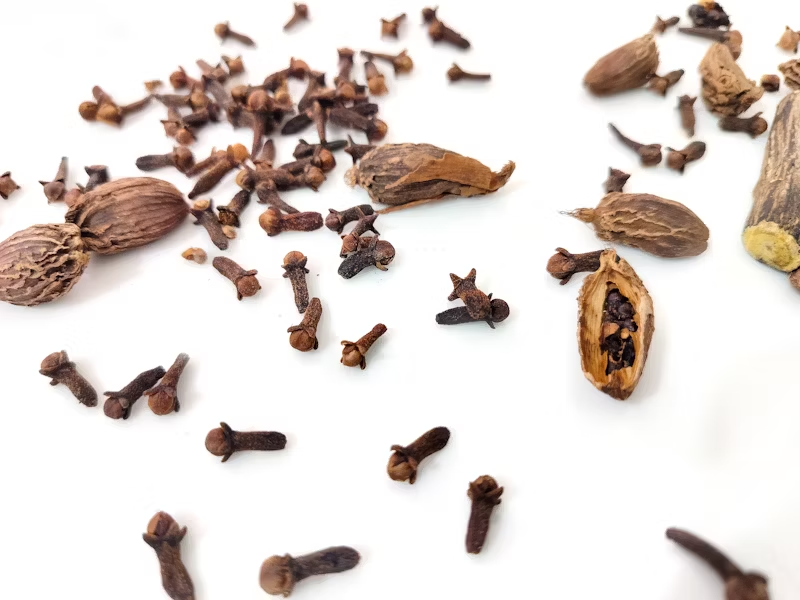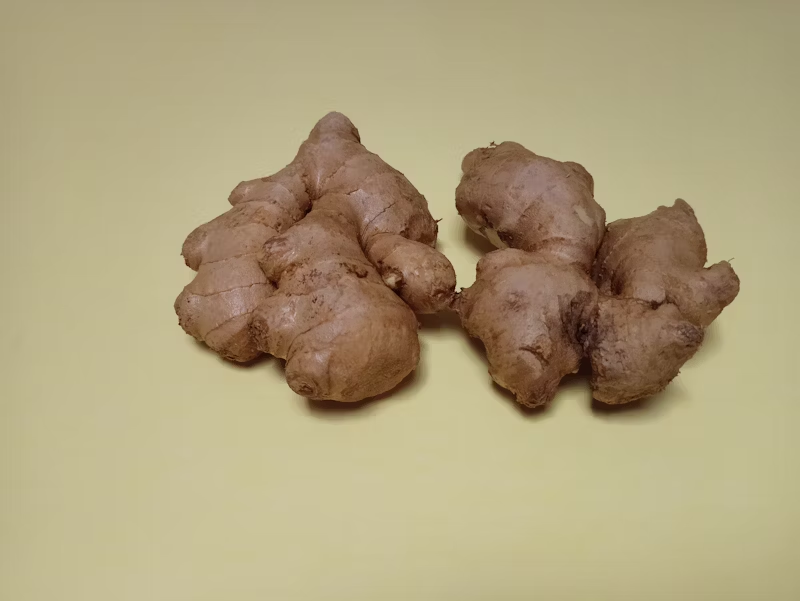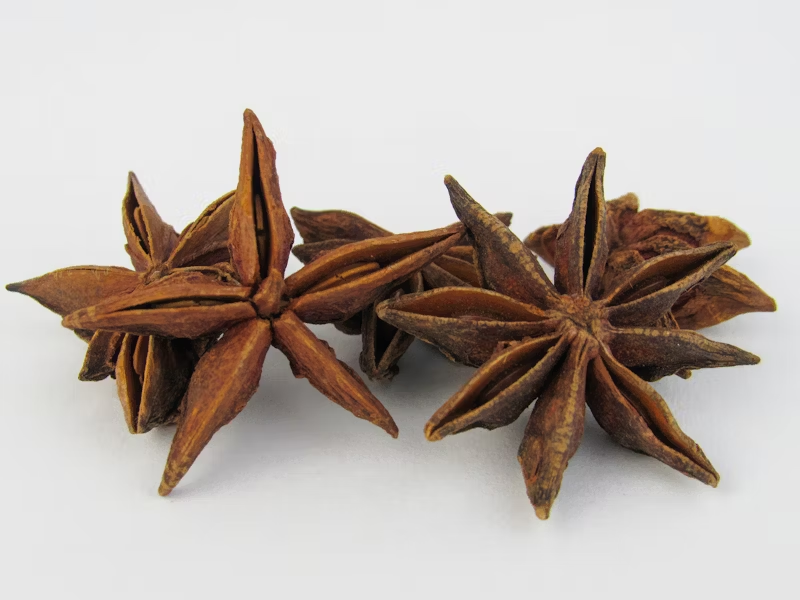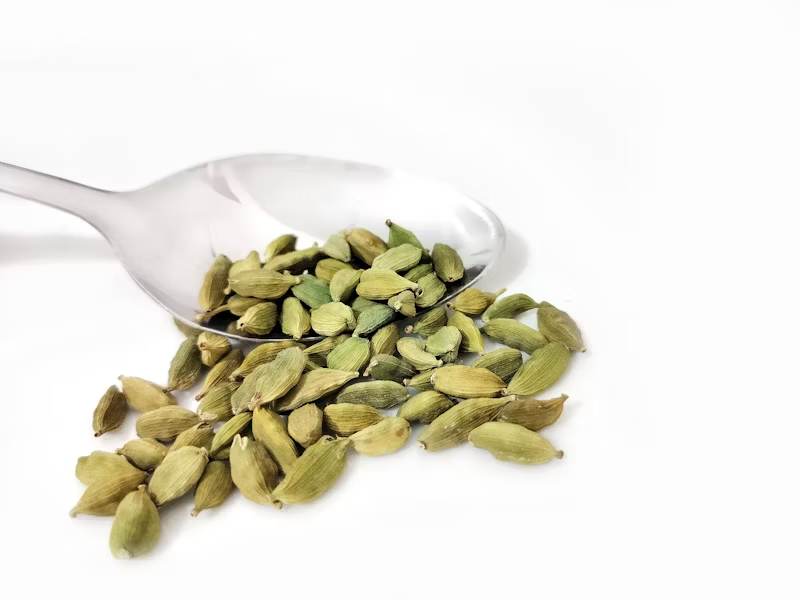Chai spices have been a prominent part of the old world for centuries with their warm smells and distinct flavors. Originally from South Asia, chai, or masala chai, has evolved into a global favorite, combining the robust taste of tea with a blend of healing spices. Each ingredient brings unique health benefits, rooted in ancient medicinal practices like Ayurveda.
There are a multitude of health benefits from the five core chai spices—cloves, cinnamon, ginger, anise, and cardamom. These spices are more than just culinary staples; they are potent natural remedies backed by scientific studies. Together, they create a powerful blend that supports physical and mental well-being.
Cloves

Cloves, the dried flower buds of the Syzygium aromaticum tree, hold a prominent place in traditional medicine due to their potent therapeutic properties. Known for their rich aroma and slightly spicy flavor, cloves are a vital component of chai tea.
Nutritional Profile and Key Compounds
Cloves are a rich source of eugenol, an oil with powerful antioxidant properties. In addition to eugenol, they contain vitamins C and K, manganese, and small amounts of calcium and magnesium.
- Rich in Antioxidants: Cloves rank among the top antioxidant-rich foods. Eugenol neutralizes free radicals, reducing the risk of chronic illnesses like cancer, heart disease, and neurodegenerative disorders.
- Promotes Oral Health: Eugenol has antimicrobial properties that combat oral bacteria, preventing gum diseases and bad breath. Many toothpastes include clove oil for this reason.
- Improves Digestion: Cloves stimulate the secretion of digestive enzymes, helping alleviate indigestion and bloating.
- Enhances Liver Function: Research suggests that cloves may protect the liver from oxidative damage and improve its overall function.
Practical Use
Whole cloves can be steeped in tea or used in spice blends for curries, while clove oil can be diluted for topical application or oral health treatments.
Cinnamon

Cinnamon, harvested from the inner bark of Cinnamomum trees, is a versatile spice with a storied history. Its medicinal properties have been revered since ancient times, from the royal kitchens of Egypt to modern holistic medicine.
Nutritional Highlights
Cinnamon contains cinnamaldehyde, a bioactive compound responsible for its characteristic flavor and health benefits. It is also rich in manganese, fiber, and antioxidants.
Health Benefits of Cinnamon
- Regulates Blood Sugar: Cinnamon’s ability to enhance insulin sensitivity makes it an invaluable tool for managing type 2 diabetes and prediabetes.
- Fights Inflammation: Its anti-inflammatory properties help combat conditions like arthritis and chronic pain.
- Improves Heart Health: Cinnamon reduces LDL cholesterol and triglycerides while maintaining HDL cholesterol, protecting cardiovascular health.
- Protects Against Infections: The antifungal and antibacterial properties of cinnamon make it effective against respiratory and skin infections.
Usage Ideas
Sprinkle ground cinnamon on oatmeal or yogurt, or use cinnamon sticks in teas, mulled wine, or soups for added flavor and benefits.
Ginger

Ginger, a rhizome revered for its fiery flavor and medicinal properties, is a cornerstone of chai spice blends. Known for its versatility, it is used in teas, dishes, and remedies worldwide.
Nutritional and Medicinal Profile
Ginger contains gingerol, a compound responsible for its anti-inflammatory and antioxidant effects. It is also rich in potassium, magnesium, and vitamin B6.
Health Benefits of Ginger
- Soothes the Digestive System: Gingerol enhances gastrointestinal motility, reducing nausea, bloating, and indigestion. It is widely used to alleviate morning sickness and motion sickness.
- Reduces Inflammation: Studies show that ginger can help relieve symptoms of osteoarthritis and rheumatoid arthritis.
- Supports Immunity: Its antiviral properties make ginger a go-to remedy for colds and flu.
- Improves Circulation: Ginger aids blood flow, reducing the risk of clot formation and cardiovascular diseases.
Incorporating Ginger
Fresh ginger can be grated into teas, smoothies, and stir-fries, or consumed as crystallized ginger for a sweet yet healthful snack.
Anise

Anise, with its distinct licorice-like flavor, has been cherished for centuries in both culinary and medicinal applications. Its subtle sweetness and aromatic quality make it an essential chai ingredient.
Medicinal Properties
Anise contains anethole, a compound responsible for its characteristic taste and health-enhancing properties. It also provides calcium, iron, and vitamin A.
Health Benefits of Anise
- Eases Digestive Issues: Anise is known for reducing bloating, gas, and indigestion.
- Balances Hormones: Its phytoestrogen content helps alleviate menopausal symptoms and supports hormonal balance.
- Enhances Respiratory Health: Anise acts as an expectorant, clearing mucus and easing coughs.
- Promotes Relaxation: The calming effect of anise can help reduce stress and improve sleep quality.
How to Use Anise
Brew anise seeds in teas, or add them to baked goods and savory dishes for a hint of sweetness.
Cardamom

Known as the “queen of spices,” cardamom is celebrated for its complex flavor and medicinal properties. Its role in chai blends enhances both taste and health benefits.
Nutritional Profile
Cardamom is a source of vitamins A and C, potassium, magnesium, and dietary fiber. It also contains essential oils like cineole and terpinene.
Health Benefits of Cardamom
- Aids Digestion: Cardamom stimulates digestive enzymes, reducing bloating and acidity.
- Detoxifies the Body: Its diuretic properties flush out toxins and reduce water retention.
- Improves Oral Health: Cardamom’s antibacterial properties combat bad breath and oral infections.
- Supports Heart Health: It helps lower blood pressure by improving circulation and relaxing blood vessels.
Incorporating Cardamom
Use cardamom pods in teas, desserts, and curries, or grind seeds into a powder for baking.
The Power of Synergy

When combined, chai spices create a synergy that amplifies their individual benefits. For example, the anti-inflammatory properties of ginger and cinnamon complement the antioxidant power of cloves, while anise and cardamom enhance digestion and relaxation.
Cumulative Health Benefits
- Digestive Health: The blend soothes the gut, reduces bloating, and enhances nutrient absorption.
- Immunity Boost: Antimicrobial and anti-inflammatory compounds strengthen the body’s defenses.
- Mental Clarity and Relaxation: The aroma and bioactive compounds in chai spices reduce stress and elevate mood.
Historical and Cultural Significance
Chai spices have been a cornerstone of Ayurvedic medicine and culinary traditions for over 5000 years. From their origins in India to their global popularity today, these spices represent a fusion of flavor, culture, and healing.
Practical Tips for Using Chai Spices

Incorporating chai spices into your lifestyle doesn’t require complex recipes or techniques. Here are easy, everyday ways to enjoy their benefits:
- Clove-Infused Oil: Create a DIY clove-infused oil by soaking cloves in olive oil. Use it for massages to relieve muscle aches or as a topical remedy for skin infections.
- Cinnamon Tea: Brew a simple tea with cinnamon sticks to enjoy its warming properties on a cold day.
- Ginger Compress: Use grated ginger wrapped in cloth as a compress to relieve joint pain or muscle soreness.
- Anise-Flavored Baking: Add ground anise to cookies, cakes, or breads for a unique flavor twist.
- Cardamom Pods in Rice: Enhance the flavor of plain rice by cooking it with a few cardamom pods.
Chai Spices in Modern Medicine

Modern research continues to validate the traditional uses of chai spices, shedding light on their potential role in preventing and managing chronic illnesses.
Antioxidant-Rich Diets and Longevity
Chai spices like cloves and cinnamon are among the richest sources of antioxidants. Antioxidants neutralize free radicals, which are responsible for cellular damage. Diets high in antioxidants have been linked to reduced risks of cancer, Alzheimer’s, and other degenerative diseases.
Anti-Inflammatory Properties
Inflammation is a key driver of many chronic illnesses, from arthritis to cardiovascular diseases. Ginger and cinnamon, with their potent anti-inflammatory effects, are valuable additions to an anti-inflammatory diet.
Potential Role in Cancer Prevention
Eugenol in cloves and cinnamaldehyde in cinnamon have shown potential in inhibiting the growth of cancer cells in laboratory studies. While more research is needed, these findings highlight the therapeutic promise of chai spices in oncology.